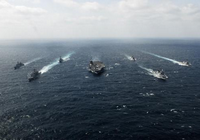On the surface, the NATO summit meeting in Lisbon, the North Korean artillery barrage against Yeonpyeong island, and the unmasking of the "fake" Mullah Akhtar Muhammad Mansour in Afghanistan would appear to be separate and unconnected events. But there is a common theme that ties these three news stories together.
In his WPR column column on Monday, Thomas P.M. Barnett summed up the problem: The United States cannot "close the gaps" in the global security system. The end of the Cold War and the rise of new power centers around the world have not led to any appreciable shift in who takes on the burdens of that system. In fact, as Alan Dowd's WPR Briefing earlier this week pointed out, America's share of the defense expenditures in NATO has risen over the past decade. Europe today has the larger economy, but Washington accounts for 73 percent of NATO's spending, up from roughly half of the alliance's total in 2000.
Despite years of rhetoric, this is not about to change. As John Cloud, the former U.S. ambassador to Lithuania, made clear, "Most European countries don't see any major threat to their security that requires ramping up the funding for NATO's hard-power capabilities." If there are gaps in trans-Atlantic security, or in the power and ability of the alliance to project power beyond Europe to address threats to the Euro-Atlantic region, they will not be filled by European contributions. But will the United States be able to continue footing the bill?

